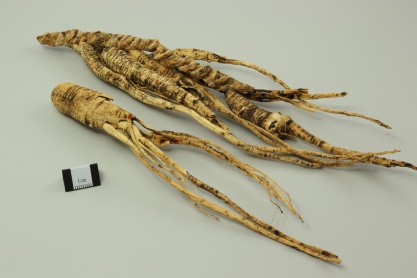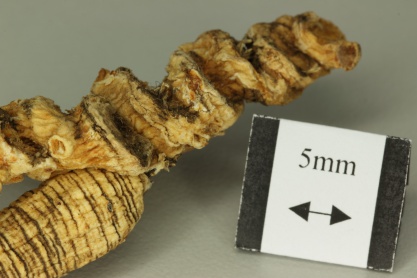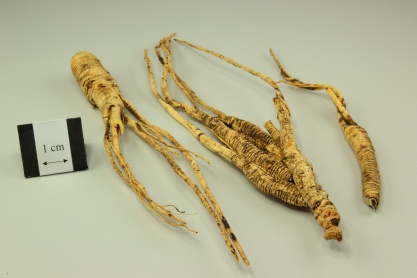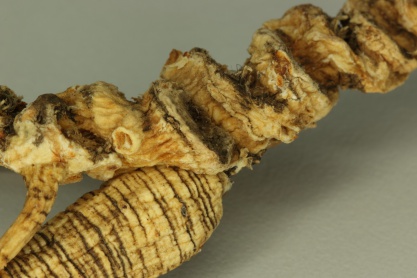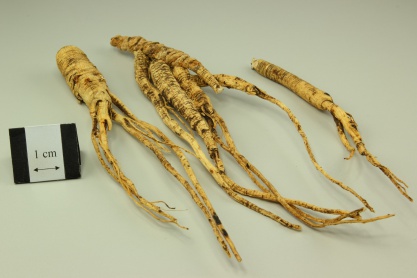- ENG
- Ginseng
- LATIN
- Ginseng Radix
| Medicinal Group | Qi-tonifying medicinal |
|---|---|
| Source | Dried root of Panax ginseng C.A. Mey. (Fam. Araliaceae) |
| Nature and Flavors | slightly bitter, sweet; neutral |
| Meridian Affinity | Heart, Spleen, Lung |
| Actions | To greatly tonify the original qi, rescue collapse and restore the normal pulse, to benefit the spleen and lung, engender fluid, and tranquilize |
Family
Part used
Indications
Fainting in debilitated patients marked by cold limbs and faint pulse, hypofunction of the spleen with loss of appetite, cough and dyspnea due to hypofunction of the lung, thirst due to impairment of body fluids, wasting-thirst caused by internal heat, general weakness from chronic diseases, palpitation, insomnia, impotence or cold in the uterus; heart failure, cardiogenic shock
Research Findings
- Panax ginseng and ginsenosides appear to inhibit processes related to COPD pathogenesis,[1]
- Panax ginseng is safe and improves cancer-related fatigue as well as overall quality of life, appetite, and sleep at night.[2]
- Panax ginseng shows promising results for improving glucose metabolism and moderating the immune response.[3]
- Panax ginseng shows antifatigue effects in patients with idiopathic chronic fatigue. [4]
- Panax ginseng administration for 4 weeks was shown to be safe, tolerable, and free of any untoward toxic effect in healthy male and female volunteers.[5]
- Ginseng supplementation is beneficial in improving glucose control and insulin sensitivity in patients with type 2 diabetes mellitus or impaired glucose intolerance.[6]
- Systematic review provided positive Research Findings of ginseng for sexual function in menopausal women.[7]
Cautions
Incompatible with Rhizoma et Radix Veratri
Report on adverse effect
Excessive and uncontrolled intake of ginseng products should be avoided [8]
Ginseng should not be combined with anticoagulants [9]
Ginseng poisoning syndrome, bleeding, neurological problems, digestive problems [10]
Hypertension, gastrointestinal disturbances, insomnia and nervousness; confusion and depression; can affect neonate development; can cause swollen and painful breasts [11]
May reduce the effect of anesthesia [12]
Reference
Reference
- Shergis JL, Di YM, Zhang AL, Vlahos R, Helliwell R, Ye JM, Xue CC. (2014). Therapeutic potential of Panax ginseng and ginsenosides in the treatment of chronic obstructive pulmonary disease. Complement Ther Med. , 22(5):944-53. doi: 10.1016/j.ctim.2014.08.006. Epub 2014 Aug 20.
- Yennurajalingam S, Reddy A, Tannir NM, Chisholm GB, Lee RT, Lopez G, Escalante CP, Manzullo EF, Frisbee Hume S, Williams JL, Cohen L, Bruera E. ( 2015). High-Dose Asian Ginseng (Panax Ginseng) for Cancer-Related Fatigue: A Preliminary Report. Integr Cancer Ther. , 14(5):419-27. doi: 10.1177/1534735415580676. Epub 2015 Apr 14.
- Shergis JL, Zhang AL, Zhou W, Xue CC. ( 2013). Panax ginseng in randomised controlled trials: a systematic review. Phytother Res. , 27(7):949-65. doi: 10.1002/ptr.4832. Epub 2012 Sep 12.
- Kim HG, Cho JH, Yoo SR, Lee JS, Han JM, Lee NH, Ahn YC, Son CG. ( 2013). Antifatigue effects of Panax ginseng C.A. Meyer: a randomised, double-blind, placebo-controlled trial. PLoS One. , 8(4):e61271. doi: 10.1371/journal.pone.0061271. Print 2013.
- Lee NH, Yoo SR, Kim HG, Cho JH, Son CG. (2012). Safety and tolerability of Panax ginseng root extract: a randomized, placebo-controlled, clinical trial in healthy Korean volunteers. J Altern Complement Med. , 18(11):1061-9. doi: 10.1089/acm.2011.0591. Epub 2012 Aug 21.
- Gui QF, Xu ZR, Xu KY, Yang YM. (2016). The Efficacy of Ginseng-Related Therapies in Type 2 Diabetes Mellitus: An Updated Systematic Review and Meta-analysis. Medicine (Baltimore). , 95(6):e2584. doi: 10.1097/MD.0000000000002584.
- Lee HW, Choi J, Lee Y, Kil KJ, Lee MS. (2016). Ginseng for managing menopausal woman's health: A systematic review of double-blind, randomized, placebo-controlled trials. Medicine (Baltimore). , 95(38):e4914. doi: 10.1097/MD.0000000000004914.
- Sonnenborn U, Hänsel R. Panax ginseng. In: De Smet PAGM et al., eds. Adverse reactions of herbal drugs. Springer-Verlag, Berlin, 1992:179–192.
- [Herbal drug-drug interaction and adverse drug reactions]. Hafner-Blumenstiel V. Ther Umsch. 2011 Jan;68(1):54-7.
- 賀鵬、高素強、傅得興 (2006)。<人參的不良反應及其合理應用>。首都醫藥,18。
- Kitts DD, Hu C (2000) Efficacy and safety of ginseng. Public Health Nutr., 3, 4, 473-485.
- Rogers, E. A., Gough, J. E., & Brewer, K. L. (2001). Are emergency department patients at risk for herb-drug interactions? Academic Emergency Medicine : Official Journal of the Society for Academic Emergency Medicine, 8(9), 932-934.


